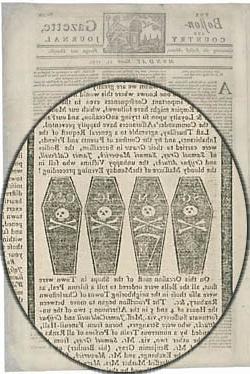Collections Online
"Boston, March 12. The Town of Boston affords a recent and melancholy Demonstration ..."
To order an image, navigate to the full
display and click "request this image"
on the blue toolbar.
-
Choose an alternate description of this item written for these projects:
- Boston Massacre
- Main description
[ This description is from the project: Coming of the American Revolution ]
Appearing a week after the Boston Massacre, this lengthy newspaper account includes details of the growing tensions and skirmishes in Boston that lead up to the violent outburst in front of the Custom House.
A Tumultuous Week in Boston
British soldiers arrive in Boston in the fall of 1768 to guard wary customs officials. Patriot leaders, whipping up hostility against the troops, publish inflammatory reports about their activities. Despised, young, and far from home, the soldiers suffer low wages and poor housing conditions. Confrontations between soldiers and townspeople grow more frequent and more violent as time passes. On 2 March 1770, soldier Patrick Walker, looking for a little extra money, asks for work at John Gray's ropewalk. Rudely treated, Walker fetches his comrades and returns for a fight. Rumor has it that additional trouble will take place on Monday, 5 March. That evening, a lone sentry posted in front of the Customs House on King Street suddenly finds himself assaulted with snowballs and insults from a swelling crowd. The ensuing chaos reverberates throughout the motherland and her American colonies.
To examine all four pages of this newspaper, please see the online display of The Boston-Gazette and Country Journal, 12 March 1770.
Questions to Consider
1. As you read the newspaper article, create a detailed timeline of the events of 2-8 March 1770. Leave room on your timeline to add additional events that you may read about in other news stories or accounts.
2. On the morning of 6 March, Bostonians have a very specific request for Lt. Gov. Hutchinson. What is it? How does Hutchinson respond to this request?
3. Column four of this news story includes a note from Thomas Preston addressed to the people of Boston. What does it say? Why do you think he would write such a note?
Further Exploration
4. Using a dictionary, find a definition for the word "massacre"? Do you think that this event meets the definition of a massacre? Use evidence from the newspaper article to support your argument.
Subjects
- Preston, Thomas
- Hutchinson, Thomas
- Adams, Samuel
- Hancock, John
- Atwood, John
- Gray, Samuel
- Leigh, Benjamin
- Attucks, Crispus
- Caldwell, James
- Maverick, Samuel
- Monk, Christopher
- Clark, John
- Paine, Edward
- Green, John
- Patterson, Robert
- Carr, Patrick
- Parker, David
- Boston Massacre
- Mob actions
- Townshend Acts
- Disillusionment with Britain
- Occupation of Boston

